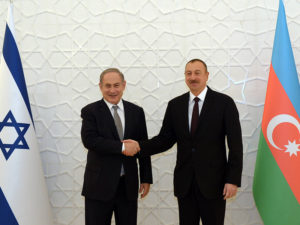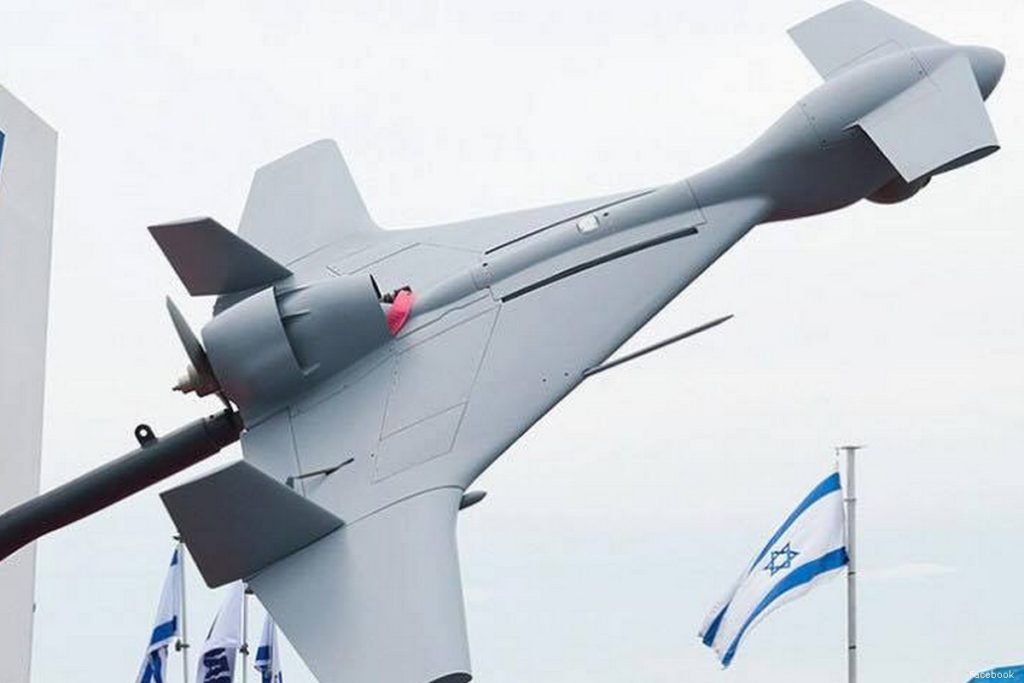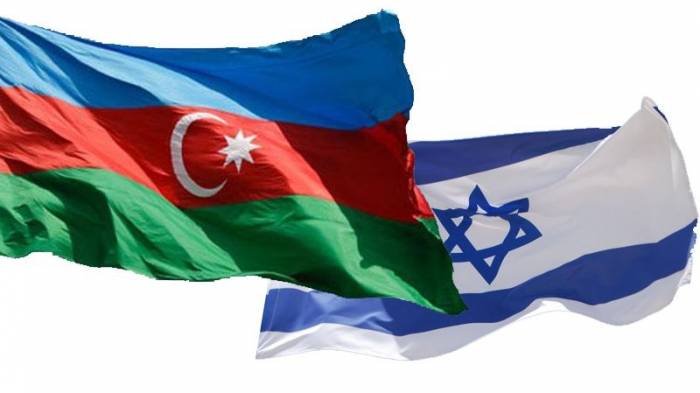Israel functions as a US proxy in the Middle East, pushing for US foreign policy and interest against its enemies – today, Iran is the only country in the region challenging the US and opposing its policies.
Iran, an oil-rich country stranded by sanctions, borders with the Persian Gulf which contains the world’s most important oil checkpoint – the Strait of Hormuz. Over 20% of the world’s crude oil supply passes through this checkpoint, making it a to-die-for geostrategic target for the US. Acknowledging resource-rich targets and aspiring to annex them to fuel its infinitely demanding capitalist ventures is nothing new imperialism in our region. In order to encircle Iran, Israel has concluded a mutual strategic partnership with Azerbaijan, an oil-rich country located in the South Caucasus, this partnership has created instability in the region. The following article will analyze the Israeli-Azerbaijani strategic relations from the economy, energy, and military angles and highlight the threat they expose to Iran, Armenia, and regional stability.
“LOVE YOUR NEIGHBOR”
Iran and Azerbaijan have shared histories, religions, and borders – they are both Shia majority states. Given the fact Azerbaijan is a secular Shia majority state, it has been praised by Western and especially Israeli media. Israelis have even drawn alternatives arguing that one day Iran can become like Azerbaijan – a Shia majority and pro-Western country. However, Azerbaijan is an authoritarian and family-run state which has persecuted religious and ethnic minorities in the country. For example, the commemoration of Ashura is limited and the government looks in a microscope of any “Iranian infiltration”. Azerbaijan historically has persecuted Armenians and continues to forcefully oppress and assimilate Talysh and Lezgin minorities. As an interesting fact, Iran contains twice the population of Azerbaijanis than Azerbaijan itself; to even more surprise, the Supreme Leader Ali Khamenei has Azeri ancestry himself. However, although bearing the same religious beliefs, the nature of how two countries prescribe to these beliefs is quite different. Much of the fundamental Shia thought that Iran, a theocracy bound by religious jurisprudence and policy, revolves around taking staunch positions against Israel and its colonial aggression against the Palestinians.
However, Azerbaijan takes a different approach.
During the last years, there were high ranking official meetings between Azerbaijan and Israel, both sides signed economic, security, and military agreements. Moreover, Israel used Azerbaijan as an intelligence base to spy on Iranian military activities in Northern Iran.

Azerbaijan President Ilham Aliyev hosts Prime Minister Benjamin Netanyahu at the Zagulba Palace in Baku on December 13, 2016
(photo credit: HAIM ZACH/GPO)
Azerbaijan and Israel, despite their religious differences, share ideological commonness, and similar political anxieties. The most basic ground for their relationship is that they both feel threatened by Iran. Azerbaijan has been known to reject Sharia law and display an affinity to the West. Both entities are rejected by their neighboring states – Azerbaijan is rejected by Iran and Armenia, who happen to be strategic partners, and Israel is vilified by Syria and Lebanon. Secondly, they both aspire to grow in military strength to expand their borders; Israel to expand its settlements and borders throughout the region and Azerbaijan exerting its pan-Turkish aspirations and “settling” its Nagorno-Karabakh dispute with Armenia. However, Azerbaijan’s neighbors have not been any good for that; Israel serves as the perfect ally, with each entity having something to offer.
SOMETHING TO OFFER; “WE LOVE GUNS”
Iran, a regional power that enjoys a strong military, a mercantilist economy, and oil-rich reserves, although having no apparent intent to inflict direct harm on Azerbaijan, stands weary of their military activity. Iran and Azerbaijan compete for energy-rich resources in the Caspian Sea while Israel seeks an alternative energy source after being isolated from the Arab states which surround it.
Iran’s main security concerns lay in Israel’s 8 military bases in Azerbaijani territory. The strategic benefit of this relationship is Azerbaijan’s proximity to Iran – however, the proximity is not all. After having a painful defeat to a militarily superior Armenia in 1994, Israel has been the most beneficent and prominent supplier of weaponry and modern technology to Azerbaijan. This comes to no surprise; in March 2020 Azerbaijani Finance minister Samir Sharifov told the annual AIPAC Policy Conference in Washington, D.C. “Cooperation with Israel is not limited to oil supply; we are interested in widening cooperation in defense and the transfer of technology.” He was one of the first Muslim leaders to give a speech at AIPAC.
Azerbaijan has been the first country to buy Sky Striker drones from Israel. According to Jerusalem Post (21/1/2019), Israeli defense company Elbit – that manufactures drones for Israel’s army – has sold its latest UAV which is capable of long-range, precise, and tactical kamikaze strikes. According to the Stockholm International Peace Research Institute, Baku in 2017 was the third-largest Israeli arms supplier ($137 million). In 2016, when Israeli PM Benjamin Netanyahu visited Baku he revealed that Azerbaijan has bought $5 billion worth of Israeli weapons and was the first country to receive this Israeli drone. Furthermore, “Israel Aerospace Industries” has also supplied Azerbaijan with Harop drones to conduct surveillance in Nagorno-Karabakh (also known as the Republic of Artsakh). The military-technical partnership between Israel and Azerbaijan is actively and permanently developing and strengthening. These agreements granted Azerbaijan better technology and strengthened Baku against Iran.

A model of the SkyStriker drone by Israel’s Elbit Systems, dubbed ‘the suicide drone’
Israel is a vital partner for Azerbaijan, not only for economic reasons but also for both sides to view each other as strategic partners on security and military issues. Azerbaijan by arming itself is not only threatening the balance of power in the South Caucasus against Armenia but also threatening Northern Iran, as many Azerbaijani high officials openly announced that Northern Iran is part of “historical greater Azerbaijan”. This has caused tensions between the two countries. Moreover, Azerbaijan’s recruitment of foreign mercenaries and terrorists in its ranks during the 1992-1994 and 2020 war has raised alarms in Iran. Tehran has many times warned Baku to be cautious and not use its territory for military purposes against Iran’s sovereignty. For example, in August 2014, a year before Iran signed the nuclear deal with six world powers (the US, Russia, China, UK, France, and Germany), the Iranian side claimed that it shot down an Israeli drone operating from Azerbaijan on a spy mission over one of its nuclear facilities. Moreover, as Azerbaijan’s economy becomes increasingly liberalized, Israeli corporations have invested heavily in the petroleum sector and in the modernization of the military strength, agriculture, and technological support by providing equipment and training programs. The total trade between Israel and Azerbaijan as of 2011 was $4 billion, which has only increased across time.
ALL ABOUT THE ENERGY SECURITY
As of 2013, 40% of oil to Israel is exported from Baku, which makes Azerbaijan Israel’s largest oil supplier. Energy security plays a crucial role in shaping the relation between these two countries.
In a 2007 speech, the Israeli ambassador to Azerbaijan, Arthur Lenk, spoke of continuous trade between Azerbaijan and Israel in the energy sector. He noted that until the inauguration of the Baku-Tbilisi-Ceyhan pipeline in 2006, Israel was a key consumer of Azerbaijani oil exports and that the proximity of Ceyhan to Israel offers excellent new opportunities for greater Israeli participation in this sector of the economy, thus creating additional areas for collaboration and mutual benefit. He underlined that through the Trans-Israel pipeline between Ashkelon and Eilat that is linking the Caspian to Israel through the Mediterranean Sea via Turkey. Israel could be a strategic partner for marketing Caspian oil to Asia; Israeli efforts in developing alternative energy resources, especially solar energy, were also mentioned. Israel additionally seeks possibilities of importing gas from the Caspian Sea region.
Moreover, Israel has invested greatly in the petroleum sector in Azerbaijan, which alone could be the main consolidator of the relationship. Through this heavyweight investment, Azerbaijan has come to provide around half of Israel’s oil imports, which further deprives Iran of oil revenues by keeping prices low and stable – something that directly threatens Iran’s energy security interests in the region.
Procurement of weapons could have two functions: either to deter the enemy or to be used. Today, we can see the direct by-product of years of military collaboration and trade between Azerbaijan and Israel, which is the attack on the Republic of Artsakh. We didn’t have to look too far to make a prediction of Azerbaijan’s expansionist aspirations, which closely resemble that of Israel’s on Palestinian land. Furthermore, it is also noteworthy to observe Turkey’s involvement in the conflict. According to Syrian Opposition forces, Turkey has sent some 4000 Syrian mercenaries from northern Syria (mainly Afrin and Idlib) to the Nagorno-Karabakh region to fight Armenia for $1500. Ankara has also promised full support for Azerbaijan, as it has already begun using their F-16s to shoot down Armenian SU-25 warplanes. Iran in its turn mobilized its 126th armed brigade in its northern border, shot down two drones from “unknown sources”. Meanwhile, both Russia and Iran expressed their concerns about the involvement of Syrian mercenaries in the war, while the Iranian Foreign Ministry Spokesperson Saeed Khatibzadeh claimed that Iran will not allow terrorist groups to turn their northern borders into security-threatening territories. Here an important question should be raised, what will be the fate of foreign terrorists in Azerbaijan after the war? Will they remain in Azerbaijan and become a burden on the state or will Turkey facilitate their transfer deep into Russia and Iran to further destabilize and decrease their political influence in the region? The spread of anti-Armenian and anti-Persian protests organized by some Iranian-Azeris in Turkish, Israeli, and Azerbaijani social media proves that all these actions were coordinated and the statement that was made by the President of the Republic of Nagorno-Karabakh was right; “Iran is also a target in this war”. Therefore, time will reveal whether the war between Armenians and Azerbaijanis (supported by Israel and Turkey) in Artsakh/Nagorno-Karabakh will expand and involve other regional powers such as Russia and Iran.
Yeghia Tashjian is a regional analyst and researcher. He has graduated from the American University of Beirut in Public Policy and International Affairs.
Mona Issa is a political activist and researcher. She has graduated from the American University of Beirut with a BA in Psychology.
The article was originally published on www.nournews.ir , 4/10/2020







